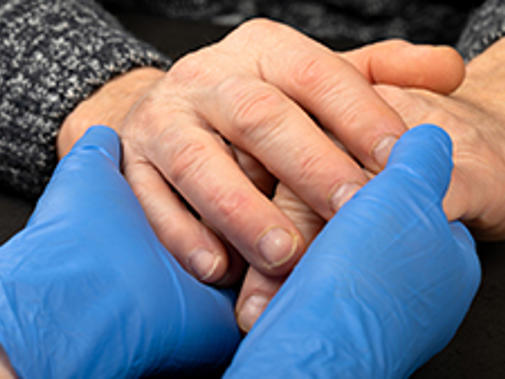‘Welcome to ICU,’ said the consultant geriatrician regarding a bay of six patients as the palliative care nurse and I appeared on his ward one morning at the height of the first wave of the COVID-19 pandemic.
This was one of the hospital’s healthcare of older people’s COVID-19 wards. In this six-patient bay, four were extremely unwell: one had rapidly deteriorated overnight, one was delirious and agitated, another was drowsy and the fourth had been on high flow oxygen for some days with no improvement.
All the patients were older men living with frailty and all needed different levels of support for what was now the last stage of their lives. We discussed with each of their families on the phone and all agreed (as the patients lacked capacity due to their condition) for transfer to the end-of-life care COVID-19 ward.
I am a geriatric medicine trainee and up until the COVID-19 pandemic, was taking time of out my training to teach medical students. Watching the spread and rapidly changing picture of the virus from China felt like a wave which turned into a tsunami. It was the uncertainty of when and how badly the wave would hit us, coupled with the inevitability that it would hit, that was most difficult to manage.
Then one Friday in March, my students were pulled from the wards, so I had no one to teach. What now? I offered to go back into clinical practice at the hospital where I was teaching and the opportunity arose to support the newly-created end of life care COVID-19 ward which was to be under the leadership of a geriatric medicine consultant. I had always had an interest in palliative care and so offered, with another registrar, to support the ward seven days a week.
At the height of the first wave, the ward felt like a place of calm and peace after the hectic hubbub of the acute wards. The team of nurses, healthcare assistants, catering staff, cleaners and us doctors had not worked on a dedicated palliative care ward before, but through excellent leadership, transformed a normal ward of side rooms into a calm, homely, colourful environment where providing quality end-of-life care was the number one priority.
Daily support from the palliative care team was essential and through building up links with the community, we could offer patients hand knitted blankets, hearts and teddy bears which we then gave to loved ones as a lasting memento.
The team had not worked together before and joined together from different disciplines including general medicine, surgery, palliative and geriatric medicine. Despite this, the strength of leadership, camaraderie and care with which the staff supported each other meant it was one of the most cohesive teams I have worked with.
There is something about going through a crisis, knowing you are all working towards the same goal and sharing in the emotional struggles that bring you together. At the start there was fear and uncertainty, but as the palliative care team encouraged us, the thank-you cards started to come in and the community support increased, our confidence grew.
You cannot get away though, from the challenging environment we were working in and the emotional impact. Having difficult conversations with relatives has always been a tough part of the job as a doctor.
It is a privilege to sit with families as they come to terms with the fragility of life. The trust they demonstrate through their willingness to be open and vulnerable with you is humbling. But added to this was distance, often over the phone or through a face mask. On the phone it is just you, the phone and them. No one else can really know what the conversation was like and the burden of that can be tough. Each conversation is unique, each family had its own story to tell and concerns to raise, which often centred around the tension of wanting to see their loved ones, whilst keeping themselves and their families safe.
Particular conversations remain with you: the wife who was so deaf that she could not hear me over the phone, so the news that her husband was dying had to be relayed to her via a neighbour. The family member who, after I relayed to them the worst news possible, then asked me how I was doing. The family who, as they are unable to be with their loved one, create a video for him with get well soon messages linked together with his favourite sporting moments. And so many thank yous.
As the palliative care team often told us, it is these last days that families remember and when we get it right, they are so grateful.
In the first 10 weeks we were open, 150 people died on our ward. You need to be able to manage this and somehow compartmentalise this level of death, but at the same time I wanted to ensure I kept my empathy and remembered the person behind each patient. The daily phone updates we offered to loved ones helped to keep this perspective.
Yet, all the raw emotion you witness is draining and at the end of it all, we all need some down time. As one of the palliative care nurses told me, of course you are going to be affected by this experience; we are all only human.
Working on the ward has been the most rewarding yet challenging period of my career so far. It has moulded me and developed me and demonstrated really the best of what our health service can be. Fortunately, the number of patients needing our care has reduced dramatically and so the ward has now closed. We will return if the need arises, but I hope not.
Rosie Arnott is an ST5 in geriatric medicine and clinical teaching fellow in Nottingham

